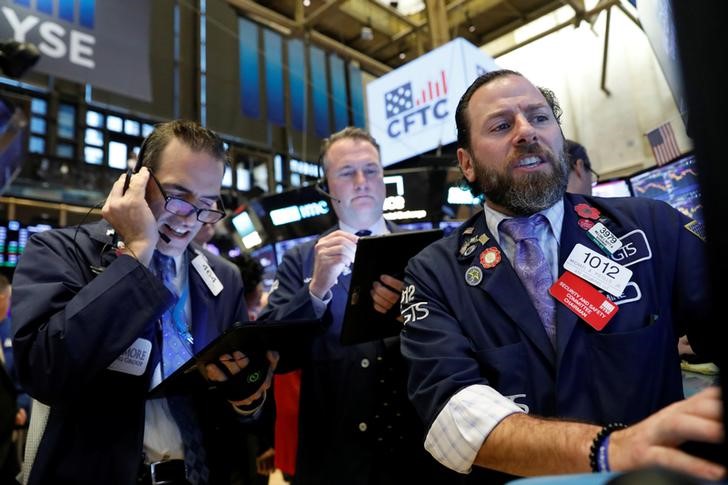By Noel Randewich
(Reuters) - U.S. stocks dipped on Tuesday, reversing earlier intraday record highs, following a report that the United States would likely maintain tariffs on Chinese goods until after November's presidential election.
The eventual removal of tariffs by Washington would depend on Beijing's compliance with the Phase 1 trade accord, which is expected to be signed on Wednesday, Bloomberg reported, citing sources.
With the S&P 500 at record levels, equivalent to around 18 times expected earnings, algorithmic traders and human investors interpreted the Bloomberg report as a reason to sell, said Joe Saluzzi, co-manager of Themis Trading, in Chatham, New Jersey.
"We're in a Jason Bourne market. The first thing Jason Bourne does when he walks into a room is look for the exit, just in case," Saluzzi said, comparing investor sentiment to the fictional action character.
The Dow Jones Industrial Average, S&P 500 and Nasdaq each touched intraday record highs before losing ground in afternoon trade. The Dow ended the session with a modest gain.
Wall Street has surged in recent weeks, fueled by optimism that a truce in U.S. President Trump's trade war with China would boost corporate earnings.
China has pledged to buy nearly an additional $80 billion of manufactured goods from the United States over the next two years, and over $50 billion more in energy supplies, Reuters reported, citing a source briefed on the Phase 1 trade deal.
Kicking off the fourth-quarter earnings season, JPMorgan Chase & Co (N:JPM) rose 1.2% after reporting a better-than-expected profit on strength in its trading and underwriting businesses.
Wells Fargo & Co (N:WFC) tumbled 5.4% after reporting a slump in profit as it set aside $1.5 billion for legal expenses. Citigroup Inc (N:C) rose 1.6% as it topped Wall Street profit estimates.
"It (bank earnings) is reflective of where we are in the economic cycle," said Mike Loewengart, vice president of investment strategy at E*TRADE Financial Corp.
"We're coming off a decade of consistent gains and banks, especially JPMorgan producing record earnings, it's not surprising given the strength of the U.S. economy."
Analysts expect profits at S&P 500 companies to drop 0.5% for the second consecutive quarter, according to Refinitiv IBES data, largely due to a drag in energy and industrial earnings that have been hit by the prolonged Sino-U.S. trade war.
The Dow Jones Industrial Average (DJI) ended up 0.11% at 28,939.67 points, while the S&P 500 (SPX) lost 0.15% to 3,283.15.
The Nasdaq Composite (IXIC) dropped 0.24% to 9,251.33.
FedEx (N:FDX) rallied 1.8% after CNBC reported that Amazon (NASDAQ:AMZN) had lifted a ban on its sellers using the company for ground deliveries.
Delta Air Lines Inc (N:DAL) rose 3.3% after better-than-expected quarterly profit, boosted by customers gained from rival airlines' 737 MAX cancellations. The S&P 1500 airlines index <.SPCOMAIR> climbed 1.5%.
Pinterest (N:PINS) surged 9.6% after a report that the online scrapbook's U.S. user base had surpassed Snap Inc's (N:SNAP), making it the third-largest social media platform.
Advancing issues outnumbered declining ones on the NYSE by a 1.42-to-1 ratio; on Nasdaq, a 1.09-to-1 ratio favored advancers.
The S&P 500 posted 60 new 52-week highs and no new lows; the Nasdaq Composite recorded 160 new highs and 27 new lows.

Volume on U.S. exchanges was 7.3 billion shares, compared with an average of 7.0 billion shares over the last 20 trading days.